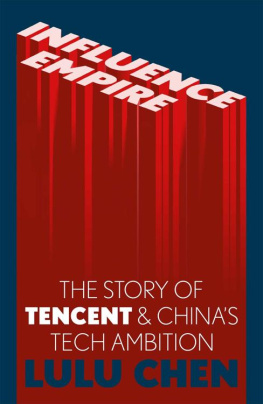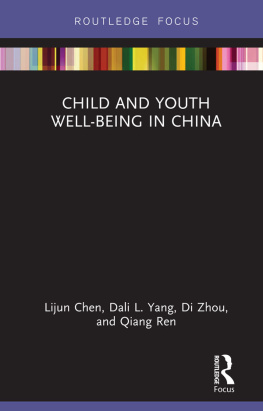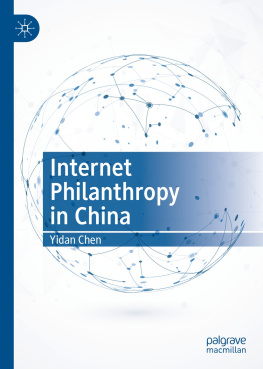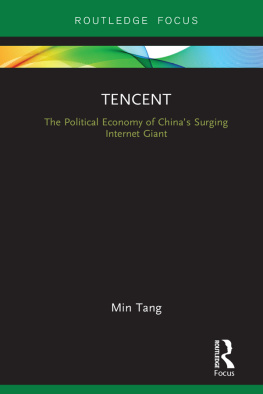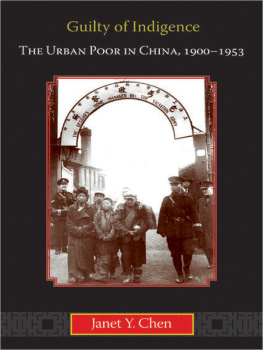Lulu Chen - Influence Empire: The Story of Tencent and China’s Tech Ambition
Here you can read online Lulu Chen - Influence Empire: The Story of Tencent and China’s Tech Ambition full text of the book (entire story) in english for free. Download pdf and epub, get meaning, cover and reviews about this ebook. year: 2022, publisher: Hodder & Stoughton, genre: Detective and thriller. Description of the work, (preface) as well as reviews are available. Best literature library LitArk.com created for fans of good reading and offers a wide selection of genres:
Romance novel
Science fiction
Adventure
Detective
Science
History
Home and family
Prose
Art
Politics
Computer
Non-fiction
Religion
Business
Children
Humor
Choose a favorite category and find really read worthwhile books. Enjoy immersion in the world of imagination, feel the emotions of the characters or learn something new for yourself, make an fascinating discovery.
- Book:Influence Empire: The Story of Tencent and China’s Tech Ambition
- Author:
- Publisher:Hodder & Stoughton
- Genre:
- Year:2022
- Rating:4 / 5
- Favourites:Add to favourites
- Your mark:
- 80
- 1
- 2
- 3
- 4
- 5
Influence Empire: The Story of Tencent and China’s Tech Ambition: summary, description and annotation
We offer to read an annotation, description, summary or preface (depends on what the author of the book "Influence Empire: The Story of Tencent and China’s Tech Ambition" wrote himself). If you haven't found the necessary information about the book — write in the comments, we will try to find it.
Lulu Chen: author's other books
Who wrote Influence Empire: The Story of Tencent and China’s Tech Ambition? Find out the surname, the name of the author of the book and a list of all author's works by series.
Influence Empire: The Story of Tencent and China’s Tech Ambition — read online for free the complete book (whole text) full work
Below is the text of the book, divided by pages. System saving the place of the last page read, allows you to conveniently read the book "Influence Empire: The Story of Tencent and China’s Tech Ambition" online for free, without having to search again every time where you left off. Put a bookmark, and you can go to the page where you finished reading at any time.
Font size:
Interval:
Bookmark:
About the Author
Lulu Yilun Chen has covered China and its technology landscape for more than a decade, for Bloomberg News and Bloomberg Businessweek. She's a multiple-time co-winner of The Society of Publishers in Asia Award. This is her first book.

www.hodder.co.uk
First published in Great Britain in 2022 by Hodder & Stoughton
An Hachette UK company
Copyright Yilun Chen 2022
The right of Yilun Chen to be identified as the Author of the Work has been asserted by him in accordance with the Copyright, Designs and Patents Act 1988.
All rights reserved. No part of this publication may be reproduced, stored in a retrieval system, or transmitted, in any form or by any means without the prior written permission of the publisher, nor be otherwise circulated in any form of binding or cover other than that in which it is published and without a similar condition being imposed on the subsequent purchaser.
A CIP catalogue record for this title is available from the British Library
Hardback ISBN 9781529346855
eBook ISBN 9781529346879
Hodder & Stoughton Ltd
Carmelite House
50 Victoria Embankment
London EC4Y 0DZ
www.hodder.co.uk
Its 2002 and Im graduating from junior high.
The final weeks of the school year were drawing to a close as was an important chapter of our lives. We spent the last school days before summer vacation unsupervised in classrooms, discussing the future with the carefree solemnity that masks the insecurities, fears and wordless anticipation of all teenagers embarking on early adulthood.
Much of the talk revolved around our plans for the upcoming summer, the prestigious new schools we were headed to, even extracurricular classes to prepare us for the grueling three years of senior high. And many of us instinctively understood how this transition would test the bonds wed forged during our tumultuous adolescent years.
Like everyone, I carefully curated my aquamarine yearbook, then coyly shoved it in front of close friends, casual acquaintances, teachers, and the boy I had a crush on. They jotted down their names, hobbies, and horoscopes. Most left phone numbers. But the more trendy amongst them attached a line of digits they called their QQ number.
I had no idea what QQ was few did back then, when Microsoft Windows was still a clunky, buggy program. PCs were the preserve of the well-to-do, at least in China. Steve Jobs had yet to conceive of the iPhone. Computers were something that we had access to for 40 minutes a week at school already considered a privilege compared with other students in Beijing, let alone across the country. The dot-com bubble was a vague notion hidden in the foreign section of newspapers. In China, only less than 20 million computers had access to the internet.
I wouldnt spare a thought for that odd moniker QQ for another two years, as I hunkered down for Chinas life-defining university entrance exam, sleeping four hours a day, blocking out everything and anything that didnt help advance my quiz skills. But as with millions across China, the name QQ gradually, almost insidiously, crept into my consciousness. And it was, in some ways, the only real thing that endured from two decades ago.
The telephone numbers my classmates scribbled hastily in my yearbook are no longer in use. Neither are the multitude of emails that ended in yahoo.com or hotmail.com. What remains is QQ and the company behind it: Tencent.
As a teenager, I had little concept of what life-long connections meant. Nor did I unduly ponder how technology morphs and shapes friendships and bonds. Its strange to think that the social networks, people and symbols we most associate ourselves with the basis of our modern-day identities are so tied up with big tech platforms. And how, when these companies grow outdated, parts of our lives vanish along with them.
Tencents entire philosophy is to be a connector. It strives to link content, information and people, helping a billion users build their identities.
Its story is about the struggle to stay relevant, to avoid the fates of the many technology giants that have made way for newer models. This book is about that struggle, and the story of a company whose success eventually threatened its very existence, potentially upsetting the political overlords at home.
Its a story about a company that many outside China not unlike much of my junior high class two decades ago struggle to grasp, years after it overtook Facebook in 2017 to become the fifth largest company in the world.
Little known to people beyond the tech community, Tencents sphere of influence extends far beyond its home turf. It reaches the screens of hundreds of millions of global gamers via titles like Fortnite and movie-goers via Hollywood blockbusters like Men in Black: International and Venom.
Backing some of the most popular global goods and services, including Tesla, Reddit, Snapchat and Spotify, its the puppet master that merges the functions of WhatsApp, PayPal, Facebook, Uber, Deliveroo, Yahoo, TikTok into one super-app known as WeChat.
Tencent has been one the worlds most powerful companies that few people outside its home turf are aware of.
Thats changing. Amid escalating tensions between China and the US, global audiences are increasingly captivated by the power-brokers in the worlds second-largest economy. From Huawei and Alibaba to artificial intelligence surveillance startups, Chinas tech giants have been thrust under the spotlight. Their fate amid a sweeping industry crackdown stemming from President Xi Jinpings campaign to curb the disorderly expansion of capital is even more intriguing.
When I started writing this book, I was inspired by the notion of unearthing the story behind one of Chinas biggest entrepreneurial success stories. For years, Ive heard people lament how China creates the best tech entrepreneurs but few writers bother to document their stories for a global audience the discourse has swung from pandering obsequiousness to casual dismissal, based on the simple notion that their achievements are of no merit because everything is controlled by the government. The truth lies somewhere in between.
I wanted to write a book that would open doors to understanding the broader landscape of the rainmakers who uphold Chinas startup and venture capital maze, to decode the rising class of magnates underpinned by technology and capital, and more importantly show how technology services run by a presence halfway across the world could affect the lives of people living in Europe and the US. I wanted to document this era before our collective memories got distorted and we missed the opportunity to tell the stories of these entrepreneurial gladiators.
As I progressed on this humbling journey, the narrative for Chinas tech industry changed drastically. What we are now facing is a paradigm shift in regulation in Chinas political landscape the government is hell-bent on reining in its biggest tech champions, which have amassed data from more than a billion users. For the Communist Party, ensuring stability at home which entails keeping the rising class of wealthy, tech-savvy moguls in place before their economic aspirations turn political is ever more pressing as tensions with the US brew.
The more important and interesting question now is: what does it take to be a successful entrepreneur in Xi Jinpings China?
For years, Tencent flew under the radar by design. Tencents billionaire founder Ma Huateng, who goes by the English name Pony, shies away from media attention. His cordon of communications chieftains have swatted and stonewalled media queries with vehemence in the past. If his arch-nemesis, Alibaba founder Jack Ma (not related), is known for his high-profile, self-aggrandising personality, then Pony Ma has made a career of hiding behind the scenes.
Next pageFont size:
Interval:
Bookmark:
Similar books «Influence Empire: The Story of Tencent and China’s Tech Ambition»
Look at similar books to Influence Empire: The Story of Tencent and China’s Tech Ambition. We have selected literature similar in name and meaning in the hope of providing readers with more options to find new, interesting, not yet read works.
Discussion, reviews of the book Influence Empire: The Story of Tencent and China’s Tech Ambition and just readers' own opinions. Leave your comments, write what you think about the work, its meaning or the main characters. Specify what exactly you liked and what you didn't like, and why you think so.

